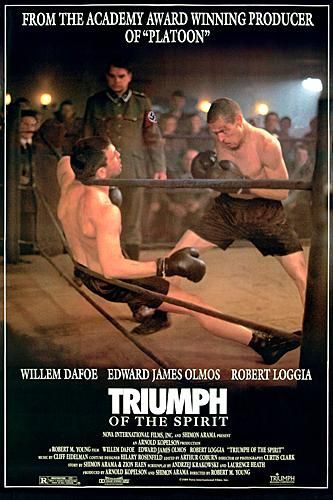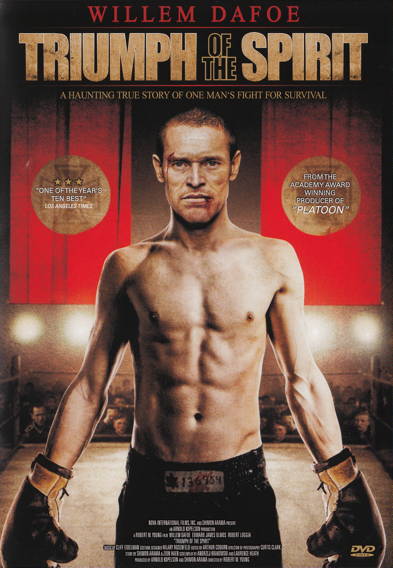

Salamo Arouch was a Greek-born Jewish boxer who survived the Auschwitz concentration death camp by fighting his fellow prisoners in bloody exhibitions staged by Nazi officers. These win or die bouts were held during the final two years of World War II. The exhibitions were the subject of the 1989 film “Triumph of the Spirit.” It was the first major motion picture filmed on location at Auschwitz. Willem Dafoe portrayed Arouch, and Arouch was a consultant to the film crew and gave boxing lessons to Dafoe.
Harry Haft (also known as Herschel Haft); born Hertzko or Hertzka Haft on July 28, 1925, in Bełchatów, Poland; died November 3, 2007) was a survivor of the Auschwitz concentration camp where he boxed fellow inmates to survive. He was briefly a professional boxer in post-war Germany and boxed as a light heavyweight in the United States from 1948–1949.
Arouch
Arouch was a young middleweight boxer in his native Salonika, Greece. When he was 14, he fought and won his first amateur boxing match in 1937 at Maccabi Thessaloniki, a Jewish youth center and gymnasium. He then won the Greek Middleweight Boxing Championship, and in 1939, won the All-Balkans Middleweight Championship, an achievement he was best known for. After compiling an undefeated record of 24 wins (24 knockouts), Arouch joined the Greek Army. While in the military he raised his boxing record to 27 wins (27 knockouts).
In 1943 German forces seized him and approximately 47,000 other Jews from Salonika. They were transported by boxcars to Auschwitz’s gas chambers and labor camps. When a German officer asked whether any of the inmates were boxers, Arouch was identified as a boxer by other inmates. The Nazi officers arranged the exhibitions for their amusement and would often bet on who would be the victor of the fight.At the time of his internment, Arouch weighed about 135 pounds. He was forced to fight at least twice a week, often against much larger men who were not trained as boxers. He defeated all of his ‘challengers.’ By his estimate, he won 208 bouts in the camp and fought to two draws. The rules were simple. The men fought until either:
- one of the fighters went down,
- officers were sick of watching or
- a fighter drew blood.

Although staged in a boxing ring, these exhibitions were not a boxing contest. They were a recurring nightmarish spectacle that was staged to satisfy the sadistic desires of the combatant’s enslaver. Defeat meant almost certain death because if the losers were badly weakened, the Nazis would kill them. Arouch was transferred in 1945 to Bergen-Belsen, where he worked at slave labor until Allied forces liberated the camp. He was among about 2,000 of the 47,000 Salonika Jews to survive the internment.


Arouch’s undefeated boxing record (1937-1955) ended on June 8, 1955 (age 32), when he was knocked out in the 4th round by Italy’s Amleto Falcinelli (age 34, pictured at left) in Tel Aviv. Falcinelli’s career record at the time of their bout was 31 wins/34 losses/17 draws. After the war Arousch lived most of his life in Israel. He was 86 years old when he died in 2009.

Haft

In 1948, aged 22, Haft emigrated to the United States where he made his living by competing as a light heavyweight prizefighter during 1948 to 1949. Haft’s professional record comprises 21 fights of a total of 104 rounds, with 13 wins (8 by KO) and 8 losses (5 by KO). His height was recorded as 5′-9″ and his weight as between 168 and 180 pounds. He won his first twelve fights.
He had a convincing win on January 14, 1949, in Binghamton, New York, 1:14 into the first of six rounds, when he scored a knockout, with a right cross that broke the jaw of his opponent. On May 30, 1949, though outweighed by 14 pounds, he defeated Johnny Pretzie by technical knockout, 2:38 into the fourth round. Pretzie was a strong puncher with an impressive knockout record, who had met Rocky Marciano only two months earlier. Haft’s final fight was against future champion Rocky Marciano, on July 18,1949, Marciano’s 18th professional fight. Marciano knocked Haft out in the third round.
According to Haft’s biography, ‘Harry Haft: Survivor of Auschwitz, Challenger of Rocky Marciano’ by Alan Scott Haft, three men threatened him to throw the fight against Marciano when he was warming up for the match. Nevertheless, the Polish-born boxer and Holocaust survivor remained undeterred by the alleged death threats and put on an exceptional performance that earned him praise despite the defeat. Haft died of cancer in Pembroke Pines, Florida in November 2007. He was 82 years old at the time of his death.

Commentary
There are no words which can describe the extreme horrors of the human mind. The actions which humans undertake speak far too better the possible and, in these instances, likely inhuman depravity of the species.
Sadly, there are no limits to what has since been classified as crimes against humanity. The experiences of Arouch and Haft and likely many unnamed others will forever change how I look at this sport and the boxing ring in particular. Even the sport of boxing was defiled by the twentieth century evil called Nazism. To have defecated within the ring would have been less of an affront to the sport and the many giants who graced this life inside the ropes. The things a man is forced to do to his fellow man, just to survive.

You must be logged in to post a comment.